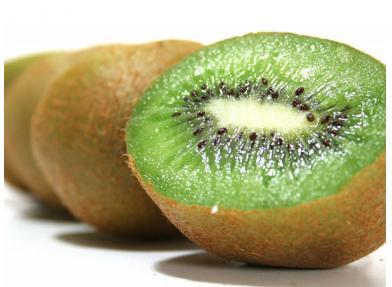|
Untitled Document
|
| |
Healthy Eating Guides |
| |
|
| |
Diet Vitamins |
| |
|
| |
|
|
|
|
|
|
|
|
| Vitamin B5 (Pantothenic Acid) |
|
|
|
|
|
| |
|
| |
|
| |
|
| |
 |
Kiwi fruit |
| Kiwi-fruit seeds are an excellent source of omega-3 fatty acids. Research studies show that consumption of foods rich in omega-3 fatty acids may reduce the risk of coronary heart disease, stroke, and help prevent the development of ADHD, autism, and other developmental disorders in children. Fresh kiwi fruit is a very rich source of heart-healthy electrolyte potassium. 100 g contains 312 mg or 7% of daily-recommended levels of this electrolyte. Potassium is an important component of cell and body fluids that help regulate heart rate and blood pressure by countering malefic effects of sodium. It also contains good amounts of minerals like manganese, iron and magnesium. Manganese is used in the body as a co-factor for the powerful antioxidant enzyme, superoxide dismutase. Magnesium is an important bone-strengthening mineral like calcium. |
|
| |
|
| |
|
| |
|
| |
 |
Gooseberries |
| They have small amounts of vitamin A. 100 g berries has 290 IU or 10 % of RDA of this vitamin. Vitamin A is required for maintaining integrity of mucus membranes and skin, and essential component of visual cycle. In addition, consumption of natural fruits rich in vitamins and flavonoid anti-oxidants has been found to protect from lung and oral cavity cancers. Fresh berries contain small amounts of essential vitamins such as pyridoxine (vitamin B-6), pantothenic acid (vitamin B5), folates, and thiamin (vitamin B-1). Some of these vitamins are essential in the sense that the body requires them for metabolism from external sources to replenish. Furthermore, gooseberries contain adequate levels of minerals such as copper, calcium, phosphorus, manganese, magnesium, and potassium. Indian gooseberries (amla) are exceptionally rich in vitamin C. However, their anti-oxidant properties come from other anti-oxidant compounds tannins (emblicanin, punigluconin, pedunculagin etc). |
|
| |
|
| |
|
| |
|
| |
 |
Peanuts |
| Peanuts and peanut butter stand out as unique healthful foods for more than just their healthy fat, protein, and fiber. They have also been recognized as a great way to get multiple nutrients in a small portion from a single food source versus a supplement. Peanuts and peanut butter are filled with a number of vitamins and minerals that we need daily in our diets, which are integral to growth, development, metabolism, and immunity. All of the nutrients in peanuts work by multiple mechanisms and are likely having synergistic effects toward improving health status. Vitamins : NIACIN helps convert food to energy. The digestive system, skin, and nerves also use niacin to function. Further, research shows that dietary niacin may protect against Alzheimers disease and cognitive decline (Morris, 2004). An ounce of peanuts is an excellent source of niacin providing a quarter of our daily needs. FOLATE is especially important in infancy and pregnancy. It helps produce and maintain cells. Research shows that people who take in higher dietary folate may have an advantage when it comes to prevention of heart disease (Rimm, 1998). An ounce of peanuts is a good source of folate providing over 10% of our daily needs. THIAMIN(B1) is essential for the functioning of the heart, muscles, and nervous system. It also helps cells in the body convert carbohydrates into energy. An ounce of peanuts is a good source of thiamin providing 10% of our daily needs. VITAMIN B6 is involved in protein and red blood cell metabolism and has a role in the nervous and immune systems. A higher intake of dietary vitamin B6 may be beneficial for heart disease. An ounce of peanuts provides over 5% of our daily needs. RIBOFLAIN (B2) has a key role in metabolizing fats, carbohydrates, and proteins. Just 2 servings provide 5% of our daily need. |
|
| |
|
|